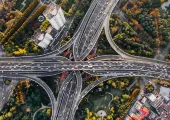2025 Shenzhen travel | Where To Stay, Eat & Explore
Catalogue
- 1. First-time in Shenzhen, China
- 2. Shenzhen Transportation: Flights | Shenzhen Baoan International Airport
- 3. Shenzhen Transportation: Trains, Bus, Subway, Taxi
- 4. Best time to visit Shenzhen
- 5. The Top 3 Things to See and Do in Shenzhen
- 6. Shenzhen Cuisine: Popular Foods in Shenzhen You Should Try
- 7. Best shopping places in Shenzhen
- 8. Local Customs in Shenzhen
- 9. Unique Travel Experiences in Shenzhen
Show More
The poster child of China's economic miracle, Shenzhen in southern Guangdong province transformed itself from a sleepy fishing village to a world-class megacity in less than 40 years. After being designated as one of the country's first Special Economic Zones in 1979, Shenzhen's economy grew over 13,000 times to become the business powerhouse it is today.
Shenzhen sits on the east bank of the Pearl River estuary and borders Hong Kong in the south. The city consists of 9 districts and 1 new area, of which three are most popular with visitors. Futian District is the modern heart of the town or the CBD, where the Shenzhen Convention and Exhibition Center, main government offices, and top 5-star hotels are located; Luohu District has the land border cross to Hong Kong, Shenzhen Railway Station, and major shopping complexes; and Nanshan district is best known for the Shenzhen Hi-Tech Industrial Park and several theme parks.

Many know Shenzhen as China's tech hub or China's Silicon Valley. Home to tech giants such as Tencent and Huawei, Shenzhen is a highly desirable place to do business. The city's business-friendly policies and highly educated labor force attract more Chinese and international companies and start-ups every year. In addition to being the largest electronic product distribution center in China, this futuristic metropolis also has one of the world's top environmentally-friendly transit systems.
In 1979, Shenzhen only had a population of around 20,000, but as of 2020, it is classed as a megacity with over 17 million people. Despite the high population, Shenzhen has won national prizes as a garden city and for its efforts in natural restoration. There are plenty of green spaces, stunning gardens, and nature reserves for people to explore. Top choices include the Mangrove Nature Reserve, Talent Park, Longtan Park, and Fair Lake Botanical Garden.
There are numerous ways to travel to and around Shenzhen. If you are flying, Shenzhen Bao'an International Airport (SZX) serves the city and the region. There are multiple transfer options between the airport and city center, such as the metro (Metro Line 11 at Airport Station, which is directly linked to the Ground Transport Center), airport express and shuttle bus (around a dozen routes to key locations across the city), and by taxi.
Being China's 7th biggest city, Shenzhen is a major gateway for foreign travelers. This vibrant and modern city has a laid-back atmosphere, excellent food scene, and fantastic sightseeing options for first-time visitors.
The most pleasant period to visit Shenzhen is Fall between September and December. If you want to avoid the crowds, the off-peak months are June and September. Also, every year around January or February, millions of workers in Shenzhen leave to go home during the Chinese Lunar New Year, so this is the least crowded time for Shenzhen's attractions.
Not sure where to stay? Choosing the right accommodation in a buzzingly city like Shenzhen can feel intimidating. Luohu District is most suitable for first-time visitors and those who love to shop as it has the greatest concentration of hotel options for all budgets. Also, it is home to Dongmen Old Pedestrian Street, one of the top commercial streets in the city. If you want to be close to key attractions, choosing a hotel in Nanshan District means you'll be a stone's throw away from some of Shenzhen's best sites.
For first-time travelers to the region, the famous must-see destinations are Shenzhen's tallest building - Ping An International Finance Center, travel the globe in Window of the World theme park, or explore the whole of China in Splendid China Folk Village.
Cantonese cuisine is one of the most world-renowned cuisines, and it came out of Guangdong Province. Hence it makes sense that favorite local dishes in Shenzhen are Cantonese good-eats, such as dim sums and seafood hot pot. For shopping fans, Shenzhen has numerous high-end retail centers (e.g., Sea World) and sprawling markets (e.g., Huaqiangbei), providing excellent opportunities for visitors to top up on clothing, electronics, and handicrafts.
Conveniently located close to Hong Kong and Guangzhou, traveling options to and around Shenzhen are numerous. Shenzhen Bao'an International Airport (SZX) is the main airport for those who choose to fly in. Ranked as China’s fifth-largest airport with over 50 million passengers travel through it every year, this airport is the base for Shenzhen Airlines and Shenzhen Donghai Airlines.
Transfer options between SZX and Shenzhen city center and other destinations like Hong Kong and Macau are fast and convenient. To Shenzhen city locations, visitors can take Airport Express Bus, Airport Shuttle Bus (330 Lines), and even City Bus lines. The cheapest option is the City Bus which is located at the airport’s Ground Transportation Center. Fares range between 2-10 RMB, but please note that tickets are purchased on the bus, and few bus operators speak English. Airport Express and Shuttle Bus have counters inside the airport where staff can help you with bus route options. Fares for Express Bus (8 routes) max out at around 25 RMB, and for Shuttle Bus (3 routes) fares range from 20-30 RMB.
Another public transport option is the Metro. Passengers can get on Metro Line 11 at Airport Station, which is directly linked to the Ground Transport Center. Line 11 connects the airport with stops in CBDs of Futian, Nanshan, and Qianhai districts. Fares range from 2-10 RMB.
A taxi is a fast way to reach downtown Shenzhen. Depending on traffic, the journey takes about 30 minutes and costs around 100 RMB. It is worth noting that most taxi drivers do not speak English, so it is best to first write down your address in Chinese. Taxis are available 24 hours a day. They are located on the east side of the second level of the Ground Transportation Center.
Shenzhen has efficient and clean transportation facilities, including buses, metro, trains, and taxis. The Shenzhen Metro is a fast, convenient and affordable way to travel. There are currently 8 lines with more planned to open in 2021. Visitors can easily reach almost every major site in the city. The trains operate between 6:30 am and 11 pm, and the fare starts at 2 RMB. Day Pass is available at 20 RMB each and can be purchased at any Shenzhen metro station. Fancy a day trip to Hong Kong? Visitors can travel on Shenzhen Metro to the border between Shenzhen and Hong Kong, then transfer to Hong Kong's MTR East Rail Line for their exploration there.
There is an abundance of taxis in Shenzhen. They are available 24 hours a day, but during the hours between 11 pm and 6 am, passengers need to pay an extra 30% as a night allowance. There are four taxi colors, red and yellow taxis operate in the urban and suburb areas, while blue indicates it’s an electric car, and green cabs can only be found in Bao’an and Longgang Districts. It is worth noting that most taxi drivers do not speak English, so it is best to first write down your destination in Chinese.
For visitors who want to pop over to Hong Kong from Shenzhen, there are several convenient ways to do so. There's no direct flight as it is only 50 kilometers (31 miles) between the two cities. But visitors can hop on the high-speed train, which only takes around 20 minutes to travel from Shenzhen North or Futian Station to Hong Kong West Kowloon Station. Other modes of transportation include the Metro or City Bus, which takes between 1.5 to 2 hours, special long-distance bus (1-2 hours), or ferry (30-60 minutes).
Like much of Southern China, Shenzhen has a subtropical climate. It is generally warm and humid all year round, but its coastal location means the weather can be changeable, including sudden thunderstorms and possible typhoons (July to September).
The coldest month is January, where it stays mildly warm at 19°C (66°F) and is mostly dry, so visitors don’t need to pack their winter clothing here. Summer is long, hot, and rainy. The scorching heat could reach as high as 40°C (104°F) from June to early October. On top of that, visitors can expect frequent showers as it is also the rainy season. Fall and Spring are the most pleasant, with relatively cool temperatures, much less rain, and bearable humidity.
The most desirable period to visit Shenzhen is from October to April, which is pleasantly warm with less rainfall. The peak tourist periods are Springtime and Fall times (March-April and October-December), the average high temperature is 27°C (81°F), and it’s the dry season, the mild weather means this is an excellent time for theme parks and outdoor fun; and Summertime, despite it is hot and humid, July and August are popular times for visitors as it is the summer holiday period for students.
Visitors should consider adding Shenzhen to their tour around China, as it would be quite something to see a modern metropolis that was a mere fishing village 40 years ago. As China's first special economic zone and one of the best-developed urban centers in the world, Shenzhen is a city of skyscrapers. One of the first thing visitors should do is ascend an iconic tower in Shenzhen. Standing at an incredible 592.5 meters (1944 feet), the tallest building in town is the Ping An International Finance Center. Located on the 116th floor is the Free Sky observatory deck, where visitors can see the skyline of Hong Kong on a clear day. Another place for that bird’s eye view of the city is the 69th floor of the Meridian View Center. For the best chance of getting that panoramic view, weather conditions from October to April are most ideal as there’s less rainfall and days are mostly sunny and clear.
For some family fun and to see the world, you can do both in one day in the Shenzhen Window of the World. Situated in the Nanshan District, this world landmark replica park creates some of the most famous scenic sites around the globe at ratios of 1:1, 1:5, or 1:15. The adventure is endless, from ancient monuments like the Pyramids and Angkor Wat to modern marvels such as Empire State Building and the Eiffel Tower.
If the world is not enough, how about exploring the whole of China too? Next door to the Window of the World is the Splendid China Folk Village. Visitors can wander through a miniature park of top Chinese attractions like The Great Wall of China and the Terracotta Army. Both of these theme parks can be easily reached by metro, bus, or taxi.
As Cantonese or Yue cuisine is the cuisine of the Guangdong province, it is not surprising that the most popular dishes in Shenzen are Yue delicacies. Cantonese dim sums or delicate pastry dishes, which can be sweet or savory, are a must-try in Shenzhen. There is a vibrant dim sum culture in the city, with many locals regularly meet up and stay for hours chatting over a small order of food. Local favorite dishes include shrimp dumplings, BBQ pork bun, congee, and fried turnip cake. The top restaurants serving these delicious morsels are Lei Garden in Luohu District, Jin Yue Xuan in Futian District, and Laurel Restaurant in Nanshan District.
Another popular local dish is Seafood Hot Pot. While the hot pot is a national favorite, the version served in Shenzen is all seafood. Shrimp, crabs, shells, and fish, all boiled in your choice of over 20 different soup bases, including a satay soup base. Both Longteng Seafood Hot Pot Restaurant and Nanshan Hotpot City are good choices for this local good-eat.
If you like sausages, why not give Cantonese sausages a try? These local pork sausages are instantly recognizable by their appetizing red color. They can be eaten steamed or fried, on its own or add to rice.
From high-end retail centers to sprawling markets, Shenzhen provides excellent opportunities for visitors to top up on clothing, electronics, and handicrafts. You can also take home some top-grade Chinese tea and teaware, panda plushies, cloisonné, and paintings as souvenirs.
Huaqiangbei Commercial Street is known as the world's largest electronics market. Starting at the intersection of Shennan Middle Road and running north, this buzzing pedestrian street is dedicated to all things tech-related. Gadget fans will be spoiled for choice here. For example, inside the towering SEG Plaza alone, there are ten floors worth of wholesale computer-and-electronics markets.
If you love to window shop and browse around for bargains, Dongmen is a great place to get lost in. Dongmen Pedestrian Street is the city’s largest outdoor market. There are numerous retailers, department stores, and street food stalls to keep you busy and entertained for hours, if not days. Remember to haggle for the best price, and the street may get very crowded at weekends.
An outing to Da Fen Village in the suburbs is both a shopping trip and a cultural experience. It is a fascinating oil painting village where you can marvel at the works of thousands of artists recreating famous masterpieces worldwide.
In comparison to other cities around the world with a similar number of tourists, Shenzhen is considered quite safe according to Western standards. Violent crime is rare, but petty crimes like pickpocketing and prostitution are common. For emergencies, dial 110 for police, 119 for firefighters, and 120 for ambulance services.
The official currency used in China is Renminbi (RMB) which is also known as Yuan. Tipping is not customary in China, but giving a gratuity to hotel staff, tour guides, and drivers is welcome.
(1) Travel Experiences in Shenzhen: Great coffee, always
Akimbo coffee lab in Shenzhen has been one of the best go-to cafes in the cit my for years and, with their iced cold-brew flavoured coffees, they have something that no other cafe in the city has.
While I’m normally not a fan of any kind of added flavours to coffee - coffee is coffee - these come in 3 different flavours (orange, grapefruit, litchi) - and are the highlight of any coffee break: flavoured without being too sweet or taking away from the coffee taste.
While their main store in Shekou Port is a bit more awkward to get to, their new headline store near OCT makes it a lot more convenient - especially for those looking for something to meituan to their office.
(2) Travel Experiences in Shenzhen: Shenzhen City Views
For a city of 20-something million people, there are a lot of hiking areas to give you that nice scenic overview of the skyline.
For this one, we drove out to Yantian where a hiking path snaked it’s way up the mountains overlooking the city.
With sunset on the way we waited with a fair few it must be said locals- all of whom had their tripods out to be able to grab the city skyline.
For people bored of the same “inner city” Shenzhen, Yantian’s trails and city lookout spots provide a nice alternative that can be done as a day trip.
All-in-all, a 10/10 day out in and around Shenzhen.
(3) Travel Experiences in Shenzhen: Shenzhen Waterfalls
For a megacity full of glass skyscrapers, it’s easy to get lost in Shenzhen’s downtown and forget to get out into the outskirts- that’s where spots like Maluanshan come in.
Easily accessible by subway (plus a short taxi journey), Maluanshan is a popular spot that ditches the glass skyscrapers for tall trees, dirt tracks and a small waterfall.
Head there early with some snacks to grab a spot on the rocks looking at the water and you’ve got the perfect little picnic spot for lunch. Then, once you’ve grabbed some snaps, head off-road for a couple of km’s to Xichong beach - the perfect end to the day.
From there, you can get a bus back to Yantian subway station on line 2.














